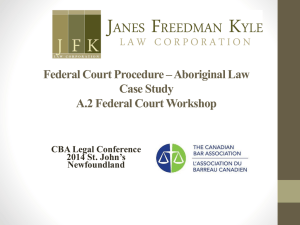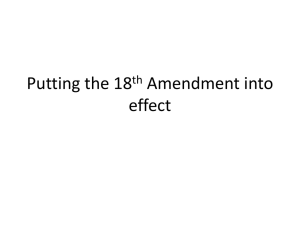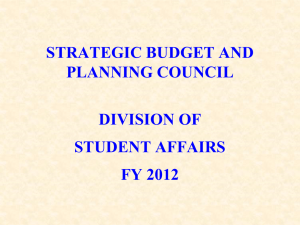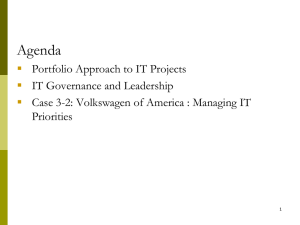select committee on cooperative governance and traditional affairs
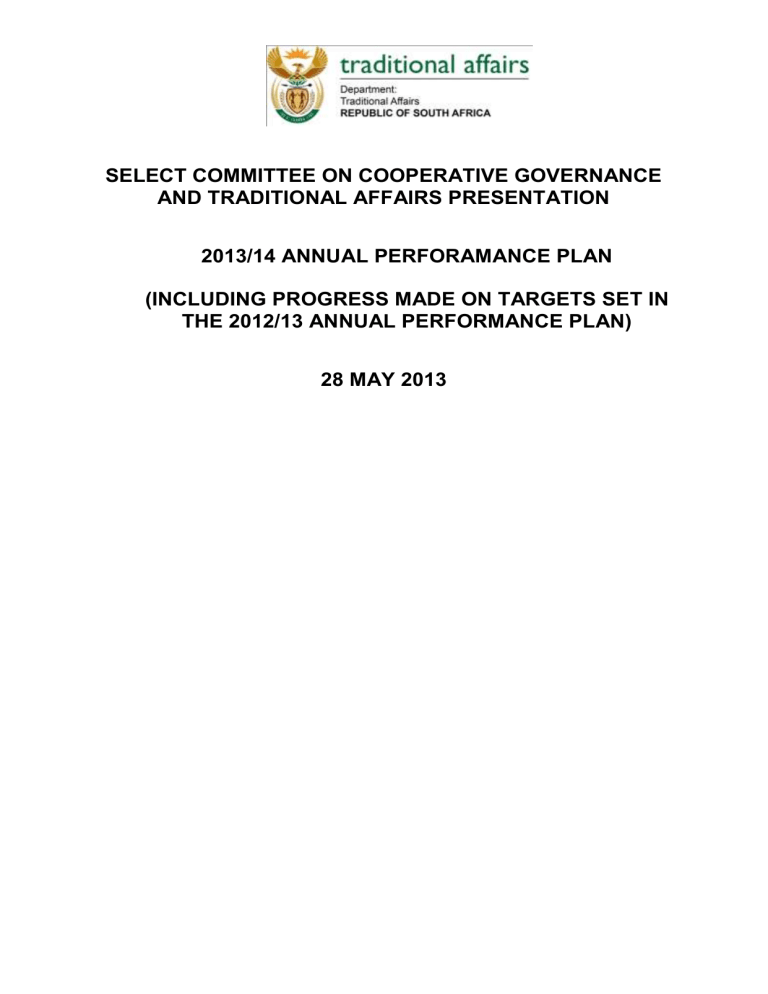
SELECT COMMITTEE ON COOPERATIVE GOVERNANCE
AND TRADITIONAL AFFAIRS PRESENTATION
2013/14 ANNUAL PERFORAMANCE PLAN
(INCLUDING PROGRESS MADE ON TARGETS SET IN
THE 2012/13 ANNUAL PERFORMANCE PLAN)
28 MAY 2013
PROGRESS REPORT ON 2013/14 ANNUAL TARGETS
No. 2012/13 APP TARGETS
1 Compliance Report on the
Implementation of the Traditional
Leadership Governance and
Framework Act
2
3
4
5
Gazette on the formula and compliance report on the establishment of kingship and queenship councils
Regulations on roles and functions of kings and queens developed
Approved Policy on Male
Initiation
National Traditional Affairs Bill
Published in the government gazette for public comments and submitted to cabinet for approval
PROGRESS REPORT
Comprehensive desktop analysis of the
Framework Act which serves as a basis for the assessment of provincial legislation has been completed. A similar analysis was also completed in respect of the National House Act.
Legislative compliance reports (comparing provincial legislation with the Framework Act) have been done in respect of the following provinces:
Eastern Cape
Free State
Gauteng
Limpopo
Mpumalanga
Northern Cape
North West
The legislation of KwaZulu-Natal has not been considered due to the fact that the Province has drafted a new Bill which is currently being considered by the province.
Draft formula has been developed and is being consolidated. It is also being considered by the
Ministerial Task Team. After the Ministerial Task
Team has completed Kings will be consulted.
Draft regulations on roles and functions of kings and queens have been developed. The draft regulations are being considered by the
Ministerial Task Team.
The Draft Policy on male initiation was developed and submitted to Cabinet.
Cabinet approved that the Draft National Policy on Male initiation must be consulted with the relevant role players, and after that it must be resubmitted to the Cabinet Committee on
Governance and Administration.
Bill was drafted, extensive pre-Cabinet consultations were conducted and finalized, and it was refined based on the inputs from the consultations. Furthermore, the Bill has been certified by State Law advisors to support parliamentary processes; and it was found to be constitutionally compliant. The Bill is in the
2
No. 2012/13 APP TARGETS
6
7
8
Research report on:
Analysis of Headmanship and Headwomanship leadership positions
The developmental role of traditional leaders
PROGRESS REPORT process of entering the Parliamentary processes.
Draft Research Report with an analysis on headmanship and Headwomanship position, including their recognition and confirmation thereof has been developed.
Research report on the developmental role of traditional leaders has been developed.
Draft Traditional Affairs Strategy Traditional Affairs Strategy has been developed.
The strategy is aimed at improving and strengthening coordination of intra and inter-sphere coordination of traditional affairs matters across the three spheres of government.
Traditional leadership institution empowered through training and linkages to other resources
The Department in collaboration with the Services
Sector Education Training Authority (SSETA), coordinated training on the application of HIV and
AIDS in a Sector/Workplace for officials in the
Houses of Traditional Leadership and Traditional councils for Eastern Cape, Free State,
Mpumalanga and Gauteng.
The Department also coordinated training on
Indigenous Law for forty traditional leaders on customary Law in the Free State province in
September 2012, which was offered by the
Justice College. The programme is designed to empower traditional leaders and their officials with knowledge of various aspects of customary related legislation which impacts on their functions.
The Department also facilitated training on marine resource and fisheries for twenty nine (29) traditional leaders and officials which took place in Port Nolloth in the Northern Cape. The training programme was presented by Rhodes University in conjunction with Local Government Sector
Education Training Authority (LGSETA). The aim of the program was to develop capacity of the traditional leaders with regards to the development of marine resources and create sustainable economic development along the coastline by exploring resources in line with the national development objectives
In addition, the department coordinated two
3
No. 2012/13 APP TARGETS PROGRESS REPORT
9
10 awareness programmes in Water and Sanitation where a total of 133 traditional leaders were inducted on water and sanitation business opportunities in the Eastern Cape.
Partnership Framework approved Partnership Framework was developed and was
Report on the implementation of the recommendations of the assessment of state of governance of leadership structures traditional approved.
The Framework seeks to address the development, establishment, and sustenance of collaborative and cohesive relations between various partners within traditional affairs.
Report on the implementation of the recommendations of the assessment of state of governance of traditional leadership structures has been developed.
The Department has developed the Traditional
Leadership Empowerment programme for implementing the recommendations of the report on state of governance of traditional leadership structures.
In order to implement the programme, the
Department has established the National
Implementation Forum constituted of the
Department of Traditional Affairs, Provincial
Traditional Affairs Departments; sector
Departments, National and Provincial Houses of
Traditional Leaders and relevant Public Entities.
The forum is functional.
To this effect the Department has also supported
Provinces to establish Provincial Traditional
Affairs Implementation Forums.
11 NHTL supported strategically as outlined in the legislation
The Department supported the National House of
Traditional Leaders in conducting induction for new members of the National House.
The Department supported NHTL financially and administratively for the reconstitution of
Traditional Councils.
The Department provided financial, human resources and professional support to the entities for the following activities:
Celebration of identified cultural events
Planning and performance management and reporting
Inauguration of members of NHTL and the
4
No. 2012/13 APP TARGETS PROGRESS REPORT official opening of the NHTL
PERFORMANCE OF THE COMMISSION ON TRADITIONAL LEADERSHIP
DISPUTES AND CLAIMS (CTLDC)
No. 2012/13 APP TARGETS
1 300 disputes and claims finalised in
2012/13. traditional leadership
PROGRESS REPORT
Finalization of the disputes and claims is dependent on the appointment of provincial committees. The number of members of the
Provincial Committees is determined by the
Premier after consultation with the Minister and the National Commission;
Five Committees were established in the following provinces with higher number of disputes and claims: Mpumalanga, Eastern
Cape; KwaZulu-Natal; North West and
Limpopo.
Each of these Committees is chaired by each of the 5 National Commissioners.
The Committees attended to the provincial claims and disputes delegated to them by the National
Commissioner and the Premier of the respective province, except those relating to kingships/queenships which are dealt with at
National level.
The Commission started with a total of 1244 disputes and claims in 2011. During 2012/13 249 traditional disputes and claims were finalised as follows:
Mpumalanga: 49 Disputes and Claims finalised
Limpopo: 72 Disputes and Claims finalised
Eastern Cape: 42 Disputes and Claims finalised
North West: 25 disputes and claims finalised
Kwazulu Natal: 44 disputes and claims finalised
National CTLDC: 19 disputes and claims were finalised.
5
______________________________________________
2013 -14 ANNUAL PERFORMANCE
PLAN FOR THE DEPARTMENT OF
TRADITIONAL AFFAIRS
_____________________________________
6
1. INTRODUCTION
The Select Committee on Cooperative Governance and Traditional Affairs requested that the Department of Traditional Affairs (DTA) presents its 2013/14 Annual
Performance Plan. This report present s the Department’s 2013/2014 Annual
Performance Plan to the CoGTA Select Committee for noting and inputs prior to finalisation of the APP in line with Section 40 (1) (e) of the PFMA.
The report outlines the Department’s vision, mission statement, strategic goals and objectives, Strategic Priorities and 2013/14 annual targets and conclusion. It gives a brief explanation of each target and what the target intends to achieve.
2. DEPARTMENT’S VISION AND MISSION STATEMENT
7
3. DTA STRATEGIC GOALS AND OBJECTIVES
The table below provides alignment of DTA strategic goal and objectives.
Goal Statements Strategic Objectives
Empowered institution of To enhance knowledge management within traditional affairs; traditional leadership To enhance alignment and standardization in the regulatory, institutional and support framework for traditional affairs across provinces and municipalities; and
To ensure that the institution of traditional leadership is empowered by reviewing and developing the empowerment programme.
Efficient and effective To accelerate the establishment of the DTA Corporate and
Department of Traditional
Affairs
Financial services; and
To establish effective governance systems for the Department
Effective and efficient To promote and integrate the role and place of traditional affairs governance systems for structures of traditional in the South African governance system by establishing synergetic relations with other governance structures across the affairs and enhanced capacity and capability three spheres of government.
Promotion of heritage,
To coordinate interfaith activities and promote indigenous culture, social cohesion and interfaith culture, heritage and social cohesion.
4. 2013/14 STRATEGIC PRIORITIES
4.1. PREAMBLE
The DTA 2013/14 priorities are informed by the following government thrusts and programmes: o National Development Plan (NDP);
8
o Cabinet Makgotla priorities; o 2012 and 2013 State of the Nation Addresses (SONA); o Priorities identified by the President during the opening of the National House of Traditional Leaders (NHTL) on 7 March 2013; o Inputs from CoGTA Portfolio Committee; o Minister’s Delivery Agreement; o LGTAS and outcome 9 priorities; o Minister’s 2012/13 Budget Vote injunctions; o DTA 2011-2014 Strategic Plan and 2012/13 Annual Performance Plan; and o Assessment of the state of governance of traditional leadership structures conducted in 2011/2012 financial year.
4.2. DTA 2013/14 IDENTIFIED PRIORITIES
4.2.1. Implementation of the Traditional leadership Outreach Programme for structures within the institution of traditional leadership
4.2.2. Implementation of the Empowerment Programme informed by the outcome of the assessment project conducted in 2011/12 FY which includes among others; development and implementation of a bursary policy for children in traditional communities including children of traditional leaders and development and implementation of outreach/empowerment training toolkit for traditional leaders on legislation impacting on the institution of traditional leadership and government programmes;
4.2.3. Profiling of 78 Traditional Councils in support of LGTAS priorities: The
Department has concluded assessment of state of governance within the traditional leadership structures broadly in 2011/12 Financial Year.
9
The following step will be to assess (profile) the 829 Traditional
Councils (TCs) starting with the prioritised 78 TCs in 2013/14; and the remaining 751 will be profiled in the remaining years of the Medium
Term Framework period.
4.2.4. Provision of support to provinces in the alignment of Provincial
Legislation with the Traditional Leadership Governance Framework Act;
4.2.5. Expediting the processing of the remaining traditional leadership disputes and claims; targeting 360 claims in 2013/14
4.2.6. Strengthening the Interfaith sector and establishment of Provincial
Interfaith chapters;
4.2.7. Promoting and supporting tourism especially cultural tourism;
4.2.8. Finalisation of the Protocol Guidelines for Kingships/Queenships and starting with the second phase focusing on senior traditional leaders in
2013/14
4.2.9. Consultation on norms and standards on tools of trade for the institution of traditional leadership to address inconsistencies across provinces;
4.2.10. Development and consultation on appropriate norms and standards for recognition and appointment of headmen and headwomen;
4.2.11. Coordination of summits, roundtable discussion, cultural events to promote heritage and social cohesion;
4.2.12. Finalising 2 nd phase of the establishment of the Department by focusing on corporate and financial services and strengthening governance systems of the Department; and
4.2.13. Development and implementation of a Monitoring and Evaluation
Framework.
5. DTA 2013-2014 ANNUAL TARGETS
10
The table below provides a synopsis of DTA 2013/14 annual targets as reflected in the Annual Performance Plan, and what each annual target intends to achieve.
NO ANNUAL TARGETS DESCRIPTION OF ANNUAL TARGETS
DTA FLAGSHIP PROJECTS
1. Development and implementation The purpose of this project is to empower all of Traditional Leadership legally recognised structures of traditional
Outreach Programme leadership on various pieces of legislation,
Development toolkit for policies, and government programmes impacting structures within the institution of on the institution of traditional leadership, in traditional leadership order for these structures to support government programmes and participate in service delivery activities.
This programme will among others comprise of the following:
National Development Plan thrusts (NDP);
Pieces of legislation impacting on traditional leadership;
2011 census focusing on rural communities;
2013 SONA thrusts;
State of the provincial addresses (SOPA);
Feedback on assessment of the state of governance within the structures of traditional leadership;
Tourism, especially cultural tourism;
Awareness on health matters (HIV and Aids, lifestyle diseases);
Awareness on family values and moral issues, including abuse of women and children ; and
Lodgment of land claims
11
NO ANNUAL TARGETS DESCRIPTION OF ANNUAL TARGETS
This programme will start in April 2013 focusing on NHTL and Provincial Houses
2. Implementation of the findings of To ensure that the findings of the assessment assessment report on state of are institutionalized within the Department, governance of structures of Traditional Affairs Empowerment Programme traditional leadership has been developed and the Department will continue with the implementation of its projects in this financial year up to the end of the MTEF period. The empowerment programme entails among others:
Generic functions across provinces
Legislative review, alignment and policy development
Protocols
Strengthening Partnerships
Traditional Affairs Strategy to ensure consistent support of the institution of traditional leadership across provinces
A National Traditional Affairs Implementation
Forum, (An IGR Forum for Traditional Affairs) has been established. This forum serves as a platform for coordination of the implementation of the Empowerment Programme and engagement with provinces on Traditional Affairs priorities.
The National Implementation Forum is also a platform to jointly address issues faced by traditional affairs with provincial COGTAs, other
Government Departments and Public Entities.
3. Profiling of Traditional Councils The Department has concluded assessment of
12
NO ANNUAL TARGETS DESCRIPTION OF ANNUAL TARGETS state of governance of traditional Leadership structures broadly in the 2011/12 Financial Year.
The next step will be the profiling of 829
Traditional Councils starting with 78 Traditional
Councils (TCs) in 2013/14 and the remaining
TCs will be profiled within the Medium Term
Framework period (2015-2016)
This Project contributes to the achievement of the Local Government Turn Around Strategy
(LGTAS) priorities.
The project entails gathering of information on each of the 78 Traditional Councils (TCs) within the 108 LGTAS prioritized municipalities that fall within the 23 deprived districts which have been identified by Cabinet for dedicated support.
The information will be gathered on the five priority areas of LGTAS namely:
Promoting sound financial management;
Enhancing Good Governance;
Fighting Corruption;
Accelerating Service Delivery; and
Facilitating sustainable infrastructure development,
The profiles will also include issues in relation to local economic development activities within each Traditional Council.
13
NO ANNUAL TARGETS DESCRIPTION OF ANNUAL TARGETS
The information gathered from the profiles will inform the development of traditional affairs norms and standards, legislation and policies and the type of support required by each
Traditional Council.
It will also enhance the departmental support to structures within traditional leadership.
DTA 2013 - 14 ANNUAL TARGETS
4 Provision of support to provinces In 2012/13 the Department supported the in respect of the reconstitution of reconstitution of traditional councils in Free State traditional councils and Mpumalanga.
The Traditional Leadership and Governance
Framework Act requires that traditional councils be reconstituted for a term of five years. In terms of the Framework Act, the Minister issued guidelines determining the number of members of traditional councils to assist and enhance uniformity.
Provinces are in the process of reconstituting their traditional councils in terms of the above mentioned guidelines.
The Department is supporting provinces to comply with the guidelines.
5. Research conducted on the The issue of community authorities and status of community authorities independent headmen/women arise from the and Independent headmen/ previous regime where there were traditional
14
NO ANNUAL TARGETS headwomen
DESCRIPTION OF ANNUAL TARGETS leaders who were wrongfully appointed during the apartheid government.
In terms of the transitional arrangements in the
Framework Act, community authorities should have been disestablished. However, they still exist. Some of the chairpersons of these community authorities lodged their claims with the Commission on Traditional Leadership
Disputes and Claims (CTLDC). Those who did not lodge any claims are supposed to be disestablished in terms of the legislative provisions.
The Department therefore needs to conduct a research to establish how these provisions were implemented, which and how many communities are affected. In addition, the research will inform the department’s future interventions, norms and standards, policies and legislation for these community authorities and independent headmen and headwomen.
This project will be completed in 2013/14.
6. 360 traditional leadership claims The Commission on Traditional Leadership and dispute cases finalized in Disputes and Claims (CTLDC) assumed duty in
2013/14 January 2011 for a five year fixed term of office to resolve 1 244 disputes and claims. The target was to finalise 300 disputes and claims in
2012/13 Financial Year and the Commission finalised 249 disputes and claims as follows:
15
NO ANNUAL TARGETS DESCRIPTION OF ANNUAL TARGETS
Mpumalanga: 49 disputes and claims finalised
Limpopo: 72 disputes and claims finalised
Eastern Cape: 42 disputes and claims finalised
North West: 25 disputes and claims finalised
Kwazulu Natal: 44 disputes and claims finalised
National CTLDC: 19 disputes and claims were finalised.
Furthermore, five Committees have been established in the following provinces with higher number of disputes and claims: Mpumalanga,
Eastern Cape; KwaZulu-Natal; North West and
Limpopo.
Each of these Committees is chaired by each of the 5 Commissioners. The Committees attend to those disputes and claims delegated to them by the Commission and the Premier of the respective province, except those relating to kingships/queenships.
The Commission prioritized provinces where there are lesser disputes and claims without provincial committees, and has processed almost all disputes and claims in provinces where there are no provincial committees, such as Gauteng, Western Cape and Free State.
The purpose of this target is therefore to finalise the outstanding traditional leadership disputes
16
NO ANNUAL TARGETS DESCRIPTION OF ANNUAL TARGETS and claims.
The Commission has targeted to process and finalise 360 disputes and claims in 2013/14.
This project entails conducting research, facilitating public hearings and conducting interviews with claimants to resolve the traditional leadership disputes and Claims.
7. Identification of Cultural and This project is intended to promote cultural
Heritage tourist attraction sites tourism and local economic development in line within traditional, Khoi and San with the 2013 SONA thrusts and priorities from communities President speech on the opening of the NHTL in
March 2013. The project involves various engagements, consultations and entering into partnerships with all spheres of government and the private sector.
8. Engagement with Interfaith This project is aimed at promoting participation of
Sector to promote moral faith communities in the governance system of regeneration and social cohesion the country to promote social cohesion, moral regeneration and peace. The project involves various forms of engagements with different sectors and stakeholders.
Interfaith consists of different faiths. The main focus is on African religions, traditional health and medicines.
9. Finalisation of the Protocol The Department has been gathering information
Guidelines for on protocols in phases which is intended to be
17
NO ANNUAL TARGETS DESCRIPTION OF ANNUAL TARGETS and collated into a Protocol Manual. Kingships/Queenships starting with the second phase focusing on gathering information The Department has completed draft protocol for protocols of senior traditional guidelines for kingships/queenships of South leaders in 2013/14 Africa in the previous financial year. The
Department will in the 2013/14 financial year further consult the Kingships/Queenships for adoption of the Protocol Guidelines for kingships/queenships.
In the 2013/14 FY, the second phase of this project will focus on protocols for principal and senior traditional leadership.
The purpose of this project is to guide the relationship amongst traditional leaders, specifically the relationships amongst kings, queens, senior and principal traditional leaders and headmen/women, as well as the relationship among traditional leaders serving in statutory structures such as the national, provincial and local houses of traditional leaders and traditional councils.
It is also aimed at guiding engagements and the relationships between traditional leaders and government, academics, researchers, businesses, international community and other stakeholders, as well as educating government institutions and the public about the institution of traditional leadership and its protocols..
18
NO ANNUAL TARGETS DESCRIPTION OF ANNUAL TARGETS
Subsequent to adoption of the Protocol
Guidelines by all levels of Traditional Leadership, the guidelines will be taken through all the required approval processes and eventually be incorporated into the State Protocol Manual.
In 2013/14 the Department will focus on two provinces in terms of the second phase of the project. The whole project will be completed within the Medium Term Framework Period
(2013-2016)
10. Partnership Framework implemented in 8 provinces
The findings of the a ssessment of state of governance of traditional leadership structures indicated that in all the provinces, there are no formal agreements entered into to promote the existing partnerships.
Furthermore, the provincial departments do not have any role during the conclusion of these partnerships; it becomes a matter between the
Traditional Council and the affected partner.
DTA has developed a Partnership Framework to support the institution of traditional leadership in the 2012/13 financial year which was consulted upon with Provincial government and sector departments. The framework will be implemented from 1 April 2013.
The purpose of this project is therefore to provide
19
NO ANNUAL TARGETS DESCRIPTION OF ANNUAL TARGETS guidelines on the formalization of partnerships within the institution of traditional leadership across provinces and to strengthen the management and coordination of partnerships within the institution.
11. Implementation of the Capacity The findings of the assessment of the state of
Building Implementation Plan governance of traditional leadership structures also indicated a need for development and implementation of a Capacity Building Plan for the institution of traditional leadership. The Plan has been developed in 2011/12 and its implementation started in 2012/13 and will continue in this financial year up to the end of the
Medium Term Framework period (2013-2016).
The implementation of the plan includes among others, conducting skills audit of traditional leaders in all the eight provinces which have recognised traditional leaders; in collaboration with Local Government Sector Education and
Training Authority (LGSETA). The skills audit will assist in identifying specific skills in various fields such as mining, leadership, presiding officer etc.
The Department does not have a standard manual for inducting newly elected members of all traditional leadership structures, and the implementation will also include development of a Standard Induction Manual which will serve as a tool to provide capacity to the newly elected members of various houses in order to effectively
20
NO ANNUAL TARGETS DESCRIPTION OF ANNUAL TARGETS run their affairs. In 2013/14, the manual will be developed and consulted with various stakeholders before implementation.
This project will also include the development and implementation of a bursary policy for traditional communities. In line with the 2013
SONA thrusts, this policy is intended to uplift the education of children within traditional communities including those of traditional leaders. The bursary will be awarded to learners who want to study in the fields of, among others:
Anthropology;
Ethnology; and
Cultural, heritage and museum studies.
12. Gathering information on landless In terms of the former Black Administration Act of traditional leaders 1927, traditional communities and leaders who did not occupy a definable geographical area were recognised and no tribal authorities were established for them. The traditional leaders were assigned civil jurisdiction only, to deal with cases. Furthermore, traditional leaders and communities who occupied a definable jurisdictional area had tribal authorities established for them and their traditional leaders were assigned with civil and criminal jurisdiction.
In terms of the Traditional Leadership and
Governance Framework Act 41 of 2003, traditional leaders and communities must occupy a specific geographical area in order to establish
21
NO ANNUAL TARGETS DESCRIPTION OF ANNUAL TARGETS a traditional council with a defined area of jurisdiction. Therefore the landless communities and their traditional leaders need to be supported to acquire land so that Traditional councils with defined jurisdictional areas could be established for them.
This target is aimed at redressing and addressing the issue of landless recognized traditional leaders who are mainly found in the
Free State and Mpumalanga.
The gathering of information regarding landless traditional leaders will result into a report. The report will be finalised and discussed with the
Department of Rural Development and Land
Reform in 2013/14 to address this issue.
13. Coordination roundtable discussion, cultural Traditional Affairs is to support and promote events and of summits, Part of the mandate of the Department of celebrations to interfaith, traditional and indigenous promote heritage and social communities. cohesion
This project is aimed at promoting interfaith collaboration and cooperation, preserving and restoring heritage and secret sites of traditional,
KhoiSan and Interfaith communities, maintaining peace, stability and social cohesion within these communities.
In this project, the Department will coordinate and facilitate various consultative sessions with
22
NO ANNUAL TARGETS DESCRIPTION OF ANNUAL TARGETS the KhoiSan, Traditional Leadership and
Interfaith sector on departmental programmes, broader government programmes, policy and legislation affecting them and their participation and support for these programmes.
The project also includes establishment of the interfaith chapters in three provinces and the chapters for the remaining six provinces will be established by the end of the Medium Term
Framework period (2015-2016).
The Department will undertake this project in collaboration with interfaith communities, traditional leadership structures and other government departments and entities.
The project will contribute to the government priority on building social cohesion and nation building.
14. Development and implementation As part of the 2 nd phase of establishment of the of the Corporate Governance Department, a corporate governance framework
Framework will be developed and implemented in 2013/14 to set up governance systems within the
Department to enhance its efficiency and
15. DTA Service Delivery effectiveness
As indicated above, the Department is in its
Improvement Plan and Service second phase of its establishment. These two
Charter developed and projects are also aimed at setting governance implemented systems; enhancing compliance with national legislation and continuously improving the
23
NO ANNUAL TARGETS DESCRIPTION OF ANNUAL TARGETS department’s services to the public.
16. Development and Implementation This project is intended to establish an effective of a Monitoring and Evaluation system of monitoring and evaluating the
Framework performance of the Department and the traditional affairs sector. It is also part of setting up governance systems for the department to enhance its effectiveness and efficiency in supporting traditional affairs sector.
4. CONCLUSION
These projects will be completed by the end of the 2013/2014 financial year (31
March 2014). The projects have been broken-down into quarterly deliverables in the
Annual Performance Plan of the Department and they will be monitored throughout the year to ensure that they are achieved.
24
